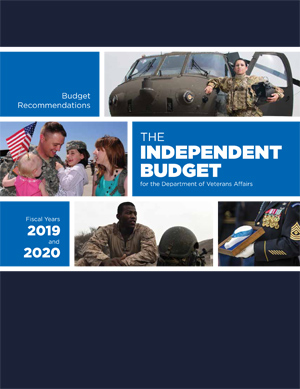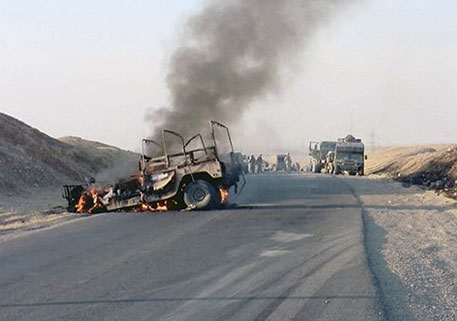Independent Budget members release annual VA funding recommendations
 DAV is once again pushing Congress to immediately address the shortfalls in the Department of Veterans Affairs budget and ensure appropriate levels of funding so wartime service-disabled veterans get the care and benefits they need and deserve.
DAV is once again pushing Congress to immediately address the shortfalls in the Department of Veterans Affairs budget and ensure appropriate levels of funding so wartime service-disabled veterans get the care and benefits they need and deserve.
Unfortunately, the VA has been forced to operate for most of the 2018 fiscal year under 2017 funding levels, $3.4 billion less than what the department says it needs for medical care.
In February, the members of the Independent Budget (DAV, Paralyzed Veterans of America and Veterans of Foreign Wars) released budget recommendations for fiscal years 2019 and 2020, on the heels of the administration’s own budget proposal.
“We commend the president’s proposed $1.8 billion increase over fiscal year 2018, as it includes much-needed funding boosts for VA health care, construction and information technology modernization,” said Deputy National Legislative Director Adrian Atizado. “However, there are still some questions over the availability of existing and proposed funding, as neither the House nor Senate has passed legislation establishing a path forward on the Choice Program.”
The VA plans to change how community care obligations are recorded, which will result in a one-time funding availability of $1.8 billion. An additional $1.9 billion is expected to be carried forward into fiscal year 2019 from the VA’s Veterans Choice Program funding, but the funds are due to run out this June. Due to these funding uncertainties and the future of the program, it remains unclear whether the VA will actually have that $3.7 billion of requested resources available in fiscal year 2019.
Proposed funding recommendations for all VA discretionary programs for fiscal year 2019 and advance appropriations recommendations for VA medical care accounts for fiscal year 2020 are particularly important because of significant efforts underway to reform and modernize the department—specifically, veterans health care.
Highlights from the fiscal year 2019 Independent Budget recommendations include:
- $82.8 billion for total medical care, an increase of $6.8 billion over the VA’s request (to include increases for prosthetics, improved access for women veterans and preparation for the VA’s caregiver support program to expand benefits to pre-9/11 veterans).
- $758 million for medical and prosthetics research, and $65 million to fund deeper, more accurate sequencing of samples collected for the Million Veteran Program.
- $1.6 billion to modernize the VA’s electronic health record, and $2.5 billion for major and minor construction.
- $3.1 billion to fund the Veterans Benefit Administration’s ability to keep pace with the current and future appeals workload, to include additional hiring.
Moving forward, Congress must ensure the VA’s budgets are sufficient to execute any new requirements imposed on the department, make needed system upgrades, and meet existing demand for care and benefits.
“For more than 30 years, DAV has collaborated with our IB partners to present a single, powerful voice of veterans to Congress,” said National Legislative Director Joy Ilem. “While we continue to stay focused on urging Congress to meet the demands for our current year, we are also looking ahead to ensure they are aware of the rising demand to provide veterans and their families with the quality services they deserve.”
Learn more
To learn more about the report and to see the full Independent Budget recommendations, visit www.independentbudget.org.






